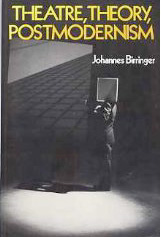Design And Performance Lab
Johannes Birringer
Theatre, Theory, Postmodernism
What do the theater, Los Angeles, and a bodybuilder have in common?
Although the combination seems unlikely, new and innovative drama studies construe these and other postmodern "constructions" as part of a theoretical paradigm that relates |textuality' to performative and cultural production. Making short order of the demand for poststructuralist analyses of contemporary drama and performance, Johannes Birringer formulates a "second stage" of theater studies by demonstrating that cultural production and representation affect more than technology, shaping aesthetic models and ideologies of the subject as well.
In Theatre, Theory, Postmodernism, Johannes Birringer explores the theory and aesthetics of performance understood as a social practice struggling with the growing impact of technological and electronic culture that reduces human experience and transforms our relationships to reality, the self, the body, and the social imaginary. His critical investigations focus on recent developments in theatre, dance, performance art, video and multimedia performance, and he makes a series of aggressive forays into the relationships between theory, critical discourse nd social history.
As response to the dematerializing and dehumanizing effrects of postmodern technologies, Birringer argues for the reinvention of theatrical consciousness based on the experienced of thye dispossessed body-in-performance. Among the artists discussed are Robert Wilson, Laurie Anderson, Pina Bausch, Heiner Mueller, Meredith Monk, Eugenio Barba, Squat Theatre, Philip Glass, Joseph Beuys, Nam June Paik, and Karen Finley.
Originally published in 1989
Bloomington: Indiana University Press.
Paperback: 256 pages
Reprinted in 1991
ISBN: 0253311950
ISBN-13: 9780253311955
Reprinted in 1993.
ISBN: 0253208459
